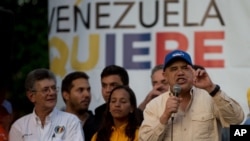Venezuela's opposition huddled on Thursday to choose a mechanism to try and oust socialist President Nicolas Maduro, with a recall referendum, constitutional change or street campaign to demand his resignation among the options.
"Venezuela is totally clear on the absolute need to get rid of this government, so we are in permanent session to define the strategy that will enable us to take power," said Jesus Torrealba, the head of the Democratic Unity coalition.
Out of power for 17 years since the late socialist leader Hugo Chavez took power, the opposition won control of the country's congress, the National Assembly, in December amid rising public ire over a bruising economic crisis.
But the coalition's two dozen parties are fractious. Furthermore, the ruling Socialists have plenty of ways to frustrate an anti-Maduro push, not least via electoral and judicial institutions that lean towards the government and could block, delay or overturn the opposition's plans.
"We honestly have no doubt that none of these (opposition) initiatives will succeed," Diosdado Cabello, the second-highest ranking Socialist Party official and former National Assembly head, scoffed this week.
Some opposition figures are pushing for a multi-pronged approach against Maduro: via pressure on the streets and a potential constitutional change by the National Assembly to reduce the president's six-year term.
Torrealba indicated the opposition had already decided on a new street push with an exhortation to Venezuelans to "join the clamor" and support "a national campaign to demand the president's resignation."
Fresh in the public's memory, however, are the rallies in 2014, led by opposition hardliners, which resulted in the deaths of 43 people on both sides, left protest champion Leopoldo Lopez in jail, and arguably strengthened Maduro by enabling him to show a strong hand.
Clash in western city
Opposition moderates fear renewed street protests could again backfire, though the circumstances have changed since 2014. Public fury is high and small protests are breaking out over food and medicine shortages, and power and water cuts.
A small group of masked youths faced off with police on Wednesday in the volatile western city of San Cristobal, which saw the first and worst of the 2014 clashes.
Two-time presidential candidate Henrique Capriles is backing a recall referendum, as allowed under Venezuela's constitution half-way through a presidential term, and is already campaigning across the country.
The opposition would need to collect 3.9 million signatures in three days, ratified by the national electoral board, to trigger a referendum within the next three months.
But the number who vote against Maduro in that referendum would need to be more than the 7.5 million who backed him in the 2013 presidential election.
If authorities delay such a vote into 2017, then Maduro's vice-president would be allowed to complete his term, thus thwarting the opposition's desire to take power.
Another option is a constitutional amendment or reform to cut Maduro's term. That could be requested either by the National Assembly or 2.9 million voters, clearing the way for a referendum.
But Venezuela's Supreme Court, which has backed the government against the opposition-controlled congress in a slew of recent controversial rulings, may shoot down any attempt to reduce the current presidential term as unconstitutional.
Illustrating the conflict of powers, the Supreme Court ruled this week that the current congress did not have authority to investigate or overturn rushed appointments of new magistrates to the tribunal in the last days of the prior congress.
"The Supreme Court's sentence is equivalent to a coup against the sovereign people, who elected a majority in the National Assembly," Torrealba said. "We're not only going to fight to get rid of Maduro, but also to save the constitution."








